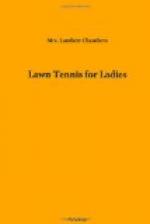At a garden party not so very long ago where tennis was on the programme, the visitors, arriving on the court, found one solitary ball, tied round with a long piece of string, the other end being attached to the net. To a natural inquiry the hostess replied, “Oh, they lost so many balls in the shrubbery last year, I really couldn’t afford it, and thought of this plan. It has been most successful. This ball has lasted for ages!” Another lady at Eastbourne, whom I had noticed because she never left her seat, bringing her lunch with her so as not to lose a moment’s play, asked me at the end of the week, while watching a double, whether the partners were side by side or opposite, as in bridge!
One of the most rooted mistakes in the public mind is that the first-class player is a professional. Many times people have said to me, “You must be making quite a nice bit of pocket-money from your tennis.” “Making?” I say. “Spending, you mean!”—which always makes them stare in amazement. This fallacy annoys me very much, and is, I find, very common. Let me take the opportunity here of pointing out that there are no professional lawn tennis players excepting a few coaches at Queen’s Club, London, and at some of the clubs abroad; these men, of course, cannot compete in open tournaments.
CHAPTER VII
MY MOST MEMORABLE MATCH (BY LEADING PLAYERS)
The following contributions, in response to a request for some account of their most noteworthy encounter on court, have been kindly furnished for this volume by leading lady players.
MRS. G.W. HILLYARD
(Champion, 1886, 1889, 1894, 1897, 1899, 1900)
One of the most exciting matches I remember was the final for the Championship at Wimbledon, played on the centre court on July 6, 1889, between Miss Rice and me. I started very nervously, as Miss Rice had given me rather a fright in the Irish Championship the month before, when she appeared in Dublin as a “dark horse.” On that occasion I had only scraped through 7/5, 7/5. I began the match at Wimbledon by serving a double fault, and lost several games by doing the same thing in the first set. My length was awful, and Miss Rice was playing well from the start. She had a very fine fore-hand drive, but, like myself, a bad back-hand. She led at 3 games to 1, and took the first set at 6/4. In the second set I regained my confidence a little, winning three love games out of the first four; but Miss Rice won the next four games in succession, the score being called 5/3 and 40/15 against me. At this point, in my despair, I said to Mr. Chipp, who was umpiring the match, “What can I do?” His grim answer was, “Play better, I should think.” I then fully realized that I had not been playing my best game, and that to win I must hit harder. This I did, with the result that my length improved and I snatched this game from the fire—although Miss Rice was three times within a stroke of the match—and I eventually won the set at 8/6.




